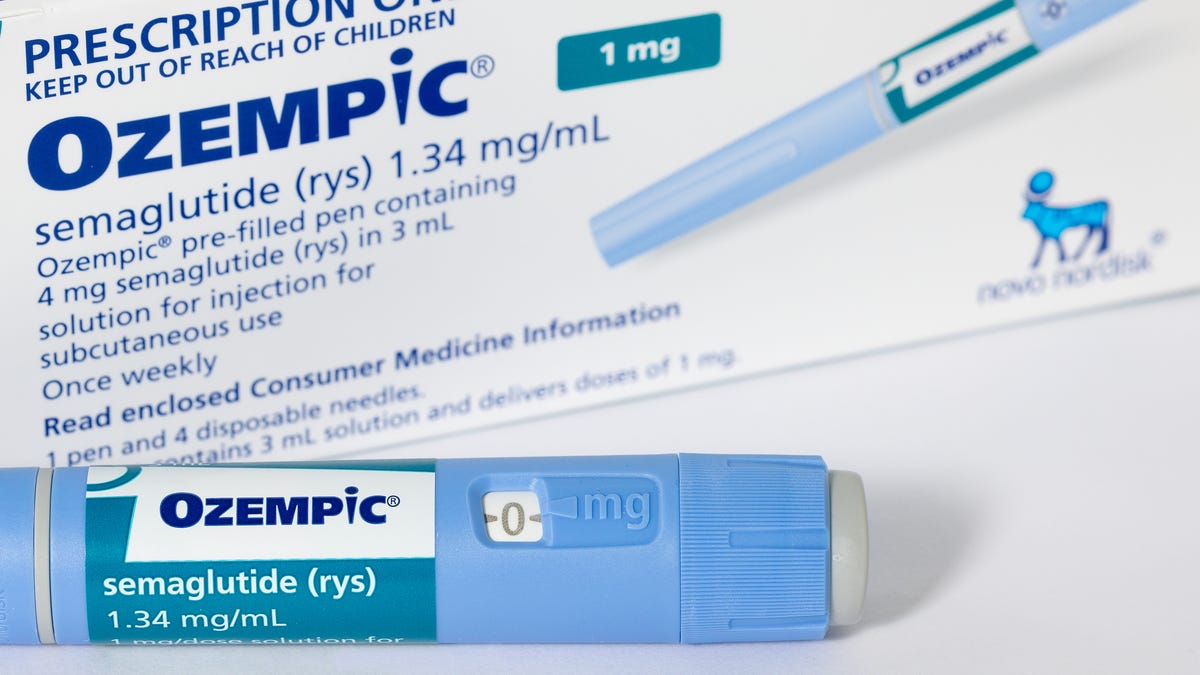Should You Take Ozempic? A Guide To GLP-1 Receptor Agonists

Table of Contents
What are GLP-1 Receptor Agonists?
GLP-1 receptor agonists are a class of medications that mimic the effects of glucagon-like peptide-1 (GLP-1), a naturally occurring hormone in your body. Understanding their mechanism of action is key to understanding their effectiveness.
Mechanism of Action:
GLP-1 agonists work in several ways to lower blood sugar and promote weight loss:
- Increased insulin release: They stimulate the pancreas to release more insulin when blood sugar levels are high.
- Decreased glucagon secretion: They suppress the release of glucagon, a hormone that raises blood sugar.
- Slowed gastric emptying: This leads to a feeling of fullness and helps regulate appetite.
- Increased satiety: GLP-1 agonists promote a feeling of fullness and reduce hunger, leading to decreased calorie intake. This appetite suppression is a key factor in their effectiveness for weight loss.
Types of GLP-1 Receptor Agonists:
Several GLP-1 receptor agonists are available, each with slightly different properties:
- Ozempic (semaglutide): Administered weekly via injection pen.
- Wegovy (semaglutide): A higher dose of semaglutide than Ozempic, specifically for weight management. Also administered weekly via injection pen.
- Trulicity (dulaglutide): Administered weekly via injection pen.
- Saxenda (liraglutide): A different GLP-1 receptor agonist, administered daily via injection pen.
- Victoza (liraglutide): Primarily used for type 2 diabetes management. Administered daily via injection pen.
These medications differ in their administration frequency (daily vs. weekly), dosage, and specific formulation. It's crucial to discuss these differences with your doctor to determine the most suitable option for your individual needs.
Benefits of GLP-1 Receptor Agonists
GLP-1 receptor agonists offer a range of potential benefits for both weight management and diabetes control.
Weight Loss:
GLP-1 agonists demonstrate significant weight loss potential, particularly for individuals with obesity or overweight conditions. Clinical trials have shown substantial weight loss percentages, often exceeding what can be achieved through diet and exercise alone.
- Significant weight loss: Studies show average weight loss ranging from 10% to 20% of body weight.
- Improved body composition: Not only do these medications promote overall weight loss, but they also help improve body composition by reducing body fat percentage.
- Reduction in body fat percentage: The reduction in body fat, specifically visceral fat (fat around the organs), contributes to improved metabolic health. This is supported by various published clinical trial data.
Type 2 Diabetes Management:
These medications are highly effective in managing type 2 diabetes by improving blood sugar control.
- Improved HbA1c levels: HbA1c is a measure of long-term blood sugar control, and GLP-1 agonists demonstrably lower HbA1c levels.
- Reduced risk of cardiovascular events: Some GLP-1 receptor agonists have been shown to reduce the risk of major adverse cardiovascular events (MACE), such as heart attack, stroke, or death. However, this benefit isn't consistent across all agonists.
- Better blood glucose control: These medications improve both fasting and post-meal blood sugar levels.
Cardiovascular Benefits:
Certain GLP-1 receptor agonists have demonstrated cardiovascular benefits beyond blood sugar control.
- Reduced risk of cardiovascular events: Studies have shown a reduced risk of heart attack, stroke, and cardiovascular death in some patients taking specific GLP-1 agonists.
- Improved blood pressure: In some individuals, these medications can contribute to improved blood pressure control.
- Improved lipid profile: Some studies have indicated a positive impact on lipid profiles (cholesterol and triglycerides) in certain patients. However, this is not a consistent finding across all studies and medications. Always consult with your doctor to understand the specifics.
Risks and Side Effects of GLP-1 Receptor Agonists
While GLP-1 receptor agonists offer significant benefits, it's crucial to be aware of the potential side effects.
Common Side Effects:
Many patients experience common side effects, which are often dose-dependent and tend to lessen over time:
- Nausea: This is a frequently reported side effect, often occurring in the initial stages of treatment.
- Vomiting: Similar to nausea, vomiting can occur, especially at higher doses.
- Diarrhea: Changes in bowel habits, including diarrhea, are relatively common.
- Constipation: Some individuals experience constipation.
- Abdominal pain: Abdominal discomfort is another reported side effect.
- Headache: Headaches can also occur.
Serious Side Effects (Rare):
While rare, serious side effects can occur and require immediate medical attention:
- Pancreatitis: Inflammation of the pancreas is a serious but rare side effect.
- Gallbladder problems: Gallstones and other gallbladder issues have been reported.
- Kidney problems: Changes in kidney function have been observed in some patients.
- Allergic reactions: Allergic reactions, ranging from mild to severe, are possible.
- Thyroid tumors (rare): Although extremely rare, an increased risk of thyroid tumors has been reported in some studies.
It is vital to report any concerning symptoms to your doctor immediately.
Drug Interactions:
GLP-1 receptor agonists can interact with other medications. It's essential to inform your doctor about all medications, supplements, and herbal remedies you are taking to avoid potential interactions.
Who Should Consider GLP-1 Receptor Agonists?
GLP-1 receptor agonists can be beneficial for specific groups of individuals.
Ideal Candidates:
- Individuals with type 2 diabetes: These medications can effectively improve blood sugar control.
- Individuals with obesity or overweight: They can aid in significant weight loss.
- Individuals seeking weight loss: Even without type 2 diabetes, these medications can be helpful for weight loss in conjunction with lifestyle changes.
Who Shouldn't Take Them?
There are certain contraindications for GLP-1 receptor agonists:
- Individuals with a history of pancreatitis: The risk of pancreatitis is increased in this population.
- Certain types of tumors: Specific types of tumors may be contraindications.
- Severe kidney disease: Individuals with severe kidney impairment should avoid these medications.
- Allergies to the medication: Patients with allergies to the active ingredient or any of the excipients should not use these medications.
Conclusion:
GLP-1 receptor agonists like Ozempic offer significant potential benefits for weight loss and diabetes management, potentially improving cardiovascular health as well. However, it’s crucial to carefully weigh the potential benefits against the risks and side effects. Before considering Ozempic or any other GLP-1 receptor agonist, consult your doctor. They can assess your medical history, discuss potential risks and benefits, and help you determine if GLP-1 receptor agonists are the right choice for your weight management or diabetes treatment plan. Remember, your doctor is the best resource for determining if Ozempic or a similar GLP-1 receptor agonist is right for you.

Featured Posts
-
 Nba World Reacts Tyrese Haliburtons Stellar Pacers Knicks Game Performance
May 28, 2025
Nba World Reacts Tyrese Haliburtons Stellar Pacers Knicks Game Performance
May 28, 2025 -
 Cristiano Ronaldo Nun Al Nassr Daki Gelecegi 2 Yillik Soezlesmenin Detaylari
May 28, 2025
Cristiano Ronaldo Nun Al Nassr Daki Gelecegi 2 Yillik Soezlesmenin Detaylari
May 28, 2025 -
 Mlb Power Rankings Padres Recent Decline
May 28, 2025
Mlb Power Rankings Padres Recent Decline
May 28, 2025 -
 Kawin Kontrak Dengan Bule Di Bali Fakta Dan Bahayanya
May 28, 2025
Kawin Kontrak Dengan Bule Di Bali Fakta Dan Bahayanya
May 28, 2025 -
 Amas 2024 Rose Rm Jimin Ateez And Stray Kids Vie For Awards
May 28, 2025
Amas 2024 Rose Rm Jimin Ateez And Stray Kids Vie For Awards
May 28, 2025
Latest Posts
-
 Altfawl Alardny Tfasyl Atfaqyat Almyah Aljdydt Me Swrya
May 30, 2025
Altfawl Alardny Tfasyl Atfaqyat Almyah Aljdydt Me Swrya
May 30, 2025 -
 Alatfaqyat Almayyt Alardnyt Alswryt Amal Jdydt Wtfawl
May 30, 2025
Alatfaqyat Almayyt Alardnyt Alswryt Amal Jdydt Wtfawl
May 30, 2025 -
 San Diego Drenched Late Winter Storm Brings Heavy Rainfall
May 30, 2025
San Diego Drenched Late Winter Storm Brings Heavy Rainfall
May 30, 2025 -
 Late Winter Storm Pummels San Diego Impacts And Aftermath
May 30, 2025
Late Winter Storm Pummels San Diego Impacts And Aftermath
May 30, 2025 -
 Selling Surplus Water San Diego Water Authoritys Cost Cutting Plan
May 30, 2025
Selling Surplus Water San Diego Water Authoritys Cost Cutting Plan
May 30, 2025
